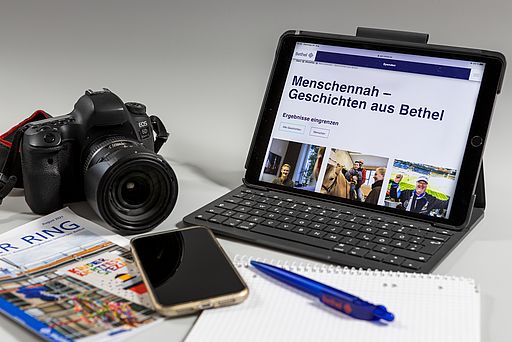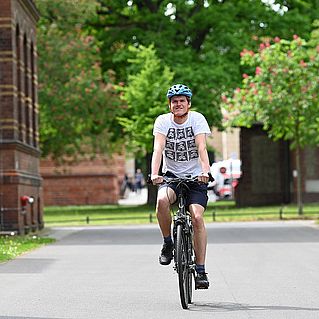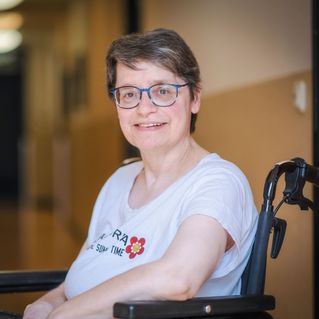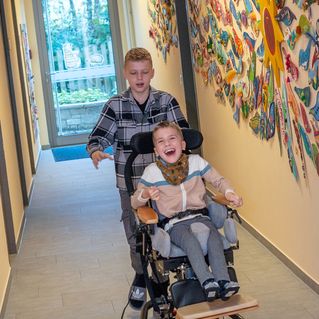
Close to people | Stories from Bethel
He doesn't let setbacks get him down
It's Monday morning. Some people may find it difficult to start the week, but not Carsten Hirsch: he is in a good mood as he sits at his desk in the Bethel stamp centre in Bielefeld. A pile of stamp blocks lies in front of him. The 42-year-old picks up the top one with three contiguous stamps and meticulously inspects the reverse. "I'm checking whether the stamps are broken," he explains and immediately finds what he's looking for. "There's no more glue here." He points to a tiny dot that is barely visible to the naked eye. He carefully removes the faulty stamp and throws it into a basket, which already contains stamps with broken teeth or discolouration.
Next year marks Carsten Hirsch's 20th anniversary at the Bethel stamp centre. What he likes about his job is that there is no pressure and he can work at his own pace. "When my concentration wanes, I sit down in the break area and have a rest." Around 125 people with disabilities are employed at the Bethel stamp centre. They receive donated items, sort the stamps and prepare them for sale. The proceeds go towards diaconal work.
Carsten Hirsch has suffered from epilepsy since he was two years old. "When I used to have a seizure, my upper body would turn 180 degrees backwards and my arms would start twitching," he explains. He often fell as a result. He has already suffered a total of twelve fractures as a result of seizures. "Since the last change of medication, I tend to have seizures at night, which is good because that's when I'm lying in a soft bed," explains the Wilhelmshaven native. For emergencies, the always friendly man, who lives in his own flat in a district of Bielefeld and receives outpatient care from Bethel, has a home emergency call button.
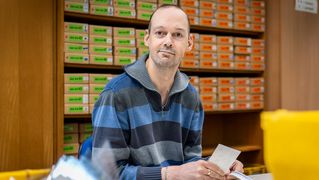
Carsten Hirsch has already undergone three operations. All of the operations were carried out in America. In 1987, the family moved to California for a year due to his father's job transfer. "My parents had great faith in the doctors in the USA," says Carsten Hirsch. He remained seizure-free for three years after the first surgical procedure. Then the epilepsy returned. The family was now living in Wilhelmshaven again.
Another job offer from his father enabled the family to move back to the USA in 1996. The city of Thousand Oaks, about 45 minutes by car from Los Angeles, became their new home for the next six years. During this time, Carsten Hirsch underwent two more operations. The third operation was risky because the doctors had to cut close to the centre of vision. "There was a risk of going blind," he recalls. However, the hope of finally being able to live seizure-free was greater than the fear. "Unfortunately, I had another seizure after just two weeks." The teenager did not let these setbacks get him down. He graduated from high school and returned to Germany with his family.
Carsten Hirsch finally moved to Bielefeld in 2005 because of the comprehensive medical care and the many work and rehabilitation opportunities offered by the Bethel Epilepsy Centre. Since this spring, he has been involved in a project at the Mara Hospital. As an Inclusive Teaching Assistant at the Bethel Specialist Hospital for Epileptology and Inclusive Medicine, he sensitises students at the OWL Faculty of Medicine at Bielefeld University to the special features of treating patients with disabilities. He is also involved in the Bethel Office for Easy Language: he checks texts, for example in flyers, questionnaires or brochures, for their readability and comprehensibility for people with disabilities. "I'm happy to help improve things."
Text: Christina Heitkämper | Image: Matthias Cremer
This story simply told
Carsten Hirsch has had epilepsy since early childhood. He underwent three operations in the USA. The seizures came back. He takes medication for them. In the past, he often broke bones because he fell during seizures. The 42-year-old works at the Bethel stamp centre. He likes his job.
Stamps for Bethel
The Bethel Stamp Centre is happy to receive stamps from all over the world and offers people with disabilities a meaningful occupation.
